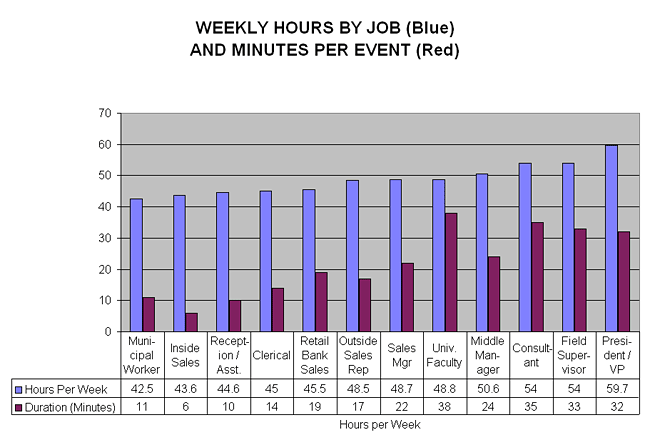Who works the longest hours? The sales rep trying to firm up a deal? The president who has to solve a delicate legal issue? Not surprisingly, there are a range of work hours, based on results from a number of time studies we have conducted using our proprietary TimeCorder device.
While participants in our studies typically track their time for two weeks, our results are reported on a weekly basis. The chart below shows total work hours, including work done at the office, at clients’ locations and at home. Business travel and breaks during the day are included, though commuting time is not. Overtime is done in the morning, at night, and on the weekends.
The average for all full-time employees is 46.7 hours per week. Within this group, municipal workers generally work 42.5 hours. Many of these are unionized employees with contracts that specify their maximum number of hours. Once negotiated, they generally stick to this The other jobs that are lower than the average do not have a travel component. Employees stay at one location.
Those who are above average have greater responsibilities, more travel, and more people management as part of their jobs.
The chart below shows work hours per week (blue bars). Those who supervise employees have longer work hours and occasions than those who do not. Independent consultants are an exception. Unlike most other employees, their income is directly related to hours worked – they have a different incentive from employees to work long hours.

The scale for the red bars is in minutes. The bars represent typical durations, showing how long each event lasts.
Both scales increase at the same time, however there is not a causal relationship between hours worked and length of duration. Rather, durations increase with added responsibilities. Inside sales reps and receptionists for instance receive a high number of short phone calls or customer visits. Hence their durations are short. Middle managers and presidents on the other hand are more involved with long term planning through meetings. Meanwhile field supervisors show a long duration because their time spent in the field is usually long.
Generally, employees work longer hours than they would like. However, salaried workers do not receive extra compensation for overtime hours. They work more hours than the norm to:
- Achieve a level of results beyond expectations in order to obtain a promotion
- Reach bonus status, whereby compensation is tied to results
- Comply with requests by senior management
- Conform with peer pressure
- Be consistent with external schedules (e.g. train schedules, car pooling, or night time courses)
- Avoid stresses elsewhere. (For some, the attraction of work occurs when work becomes like home and home is too much work)


0 Comments